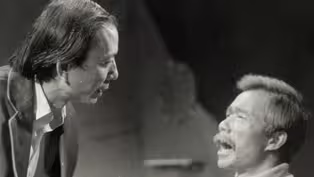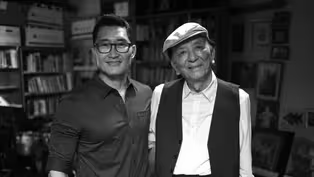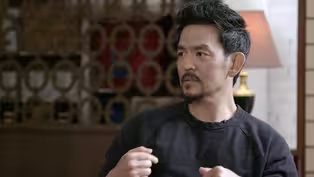
Miss Saigon Revisisted: Unpacking Yellowface & Controversies
Clip: Season 14 Episode 6 | 3m 28sVideo has Closed Captions
East West Players revisit controversies surrounding 1991 Broadway musical "Miss Saigon."
In 1990, West End musical "Miss Saigon" was poised for a Broadway run. But before it would make its debut, the production faced major backlash for its yellowface casting. This sparked significant protest led by Asian American actors and organizations, marking one of the first movements against yellowface in theater history. The East West Players revisit the show's enduring impact and controversy.
Problems playing video? | Closed Captioning Feedback
Problems playing video? | Closed Captioning Feedback
Artbound is a local public television program presented by PBS SoCal

Miss Saigon Revisisted: Unpacking Yellowface & Controversies
Clip: Season 14 Episode 6 | 3m 28sVideo has Closed Captions
In 1990, West End musical "Miss Saigon" was poised for a Broadway run. But before it would make its debut, the production faced major backlash for its yellowface casting. This sparked significant protest led by Asian American actors and organizations, marking one of the first movements against yellowface in theater history. The East West Players revisit the show's enduring impact and controversy.
Problems playing video? | Closed Captioning Feedback
How to Watch Artbound
Artbound is available to stream on pbs.org and the free PBS App, available on iPhone, Apple TV, Android TV, Android smartphones, Amazon Fire TV, Amazon Fire Tablet, Roku, Samsung Smart TV, and Vizio.
Providing Support for PBS.org
Learn Moreabout PBS online sponsorshipActor: ♪ Yeah, I got the moxie ♪ David: I first heard about the yellowface casting of Jonathan Pryce as the Eurasian pimp in the musical "Miss Saigon" when it was still in London.
Jonathan Pryce: [Indistinct].
David: The show was coming to New York, and it became kind of the first big yellowface protest in American theater history.
East West Players, Pan Asian here in New York, Asian-American theater companies, but these institutions existed already to coordinate a response.
Tim: All the Asian actors, we were on a speakerphone in New York with BD Wong and David Henry Hwang.
It was the actors mobilizing, "How are we going to change this and say this is wrong?
The whole idea of yellowface is wrong."
[Protestors chant, indistinct] Tim: David Henry Hwang and the Asian-American actors from New York picketed Equity in New York.
And we picketed in L.A. in front of Actors' Equity.
David: You know, I was really involved in the casting protest, but not so involved in the content protest.
Diep Tran: "Miss Saigon" is a story about how these poor Vietnamese people, like, the Americans abandoned them and they had no choice but to kill themselves.
But every Vietnamese person I have ever known was superhumanly strong, like my mother and my father.
Like, Asians are survivors.
And at that point, we had never been portrayed as survivors.
David: We lost the battle, but it jump-started the conversation which had never been really considered before.
Younger Tim: We began to empower ourselves that the only way that we could prevent something like this ever happening again was to take control of a production, to have that creative input in writing the play, in directing a play.
Tim: We didn't necessarily know of any Asian-American musicals, so, you know, all of us got together and developed this piece about an Asian-American nightclub in the forties, "Canton Jazz Club."
Singers: ♪ Show-stoppin', start hoppin' gonna get this hotspot rockin' ♪ Tim: You were the owner of the nightclub.
Emily: Uh-huh.
Tim: Uh, Roxie Gow, I think.
Tough as nails.
I mean, um, she was a bull.
[Laughter] Emily: I was a bull.
Tim: She was a bull.
Emily: And then he had me do stuff, like, fly up in the air, and guys had to catch me.
Tim: Oh, that's right.
See, I choreographed that, too, right?
Emily: You did!
Tim: So, oh, my gosh.
Well, you know, and Emily was young and spry back then.
So... Emily: I was young then.
I'm telling you, on a good night, when everybody's in tune and singing, you know, it's kind of, like, sends chills up your spine.
And it was very gratifying.
It was like, "Yeah, we can do this.
We are doing this."
And it showed the world that maybe Broadway's wrong.
Actor: ♪ Don't talk down to me Actor 2: ♪ Don't talk back Actor 3: Hey, Phillip, what's up?
Phillip: Representation.
Artistic Conflict in Frank Chin's 'Year of the Dragon'
Video has Closed Captions
Preview: S14 Ep6 | 2m 2s | East West Players reflect on artistic tensions behind-the-scenes of 'Year of the Dragon.' (2m 2s)
East West Players: A Home on Stage (Preview)
Video has Closed Captions
Preview: S14 Ep6 | 30s | Chronicling the 58-year history of the longest running theatre of color in the U.S. (30s)
John Cho on 'American Pie' and Diversity in Hollywood
Clip: S14 Ep6 | 1m 13s | Actor John Cho discusses Hollywood's gradual progression towards more diverse roles. (1m 13s)
Providing Support for PBS.org
Learn Moreabout PBS online sponsorship
- Arts and Music
The Best of the Joy of Painting with Bob Ross
A pop icon, Bob Ross offers soothing words of wisdom as he paints captivating landscapes.













Support for PBS provided by:
Artbound is a local public television program presented by PBS SoCal



